Tsinghua News Network, April 18 (Reporter Tian Qu, Ziyue Xu, Photography Pai Li) On the occasion of welcoming the 113th anniversary of the university, on the morning of April 18, Tsinghua University held the establishment ceremony for the Department of Psychological and Cognitive Sciences in the rear hall of the Main Building. This is an important step for Tsinghua University in strengthening disciplinary development, and another key initiative focused on serving national strategies and advancing human development.
Yong Qiu, Secretary of the Party Committee of Tsinghua University, Zhimin He, Standing Committee Member and Deputy Secretary-General (concurrent) of the National Committee of the Chinese People's Political Consultative Conference and Vice Chairman of China Association for Promoting Democracy, Hongwen Yao, Party Secretary and Director of National Center for Mental Health and Psychiatric Prevention and Treatment, Chongde Lin, Senior Professor of Beijing Normal University, Yanjie Su, Chairman of Chinese Psychological Society, Wenye Zhou, son of Professor Xiangeng Zhou who made pioneering contributions to Tsinghua's Department of Psychology, and Wangjia Yan, Chairman of Venustech, attended the ceremony and delivered speeches. More than one hundred people attended the ceremony, including leaders from relevant departments and partner universities, scholars in psychology-related fields, representatives from the business community, leaders from university units, and faculty and student representatives. Bin Yang, Standing Committee Member of the Party Committee and Vice President of Tsinghua University, presided over the ceremony and announced the decision to establish the Department of Psychological and Cognitive Sciences.
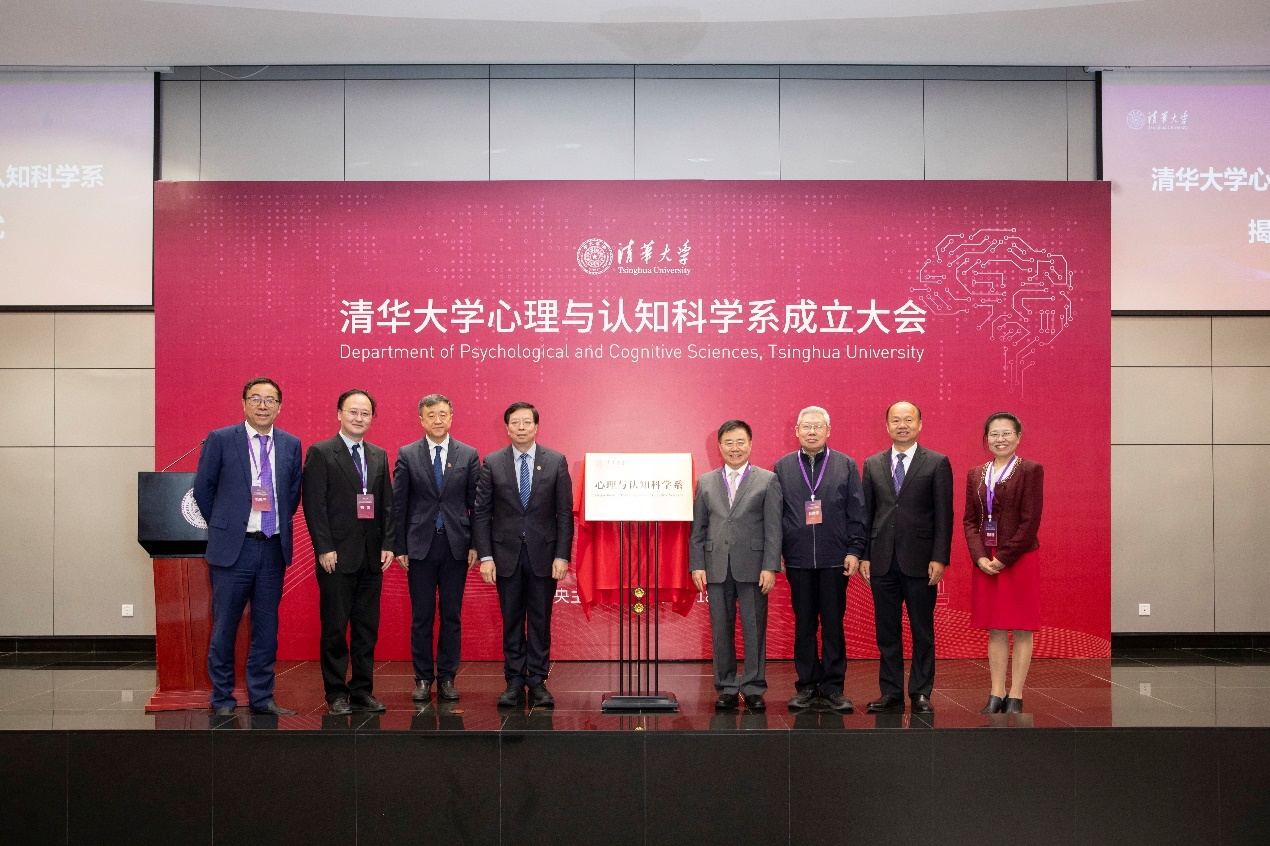
The attending guests jointly unveiled the plaque
At the ceremony, Yong Qiu, Zhimin He, Hongwen Yao, Chongde Lin, Bin Yang, Yanjie Su, Jia Liu, Director of the Department of Psychological and Cognitive Sciences, and Kaiping Peng, Professor of the Department of Psychological and Cognitive Sciences, jointly unveiled the plaque for the Department of Psychological and Cognitive Sciences.
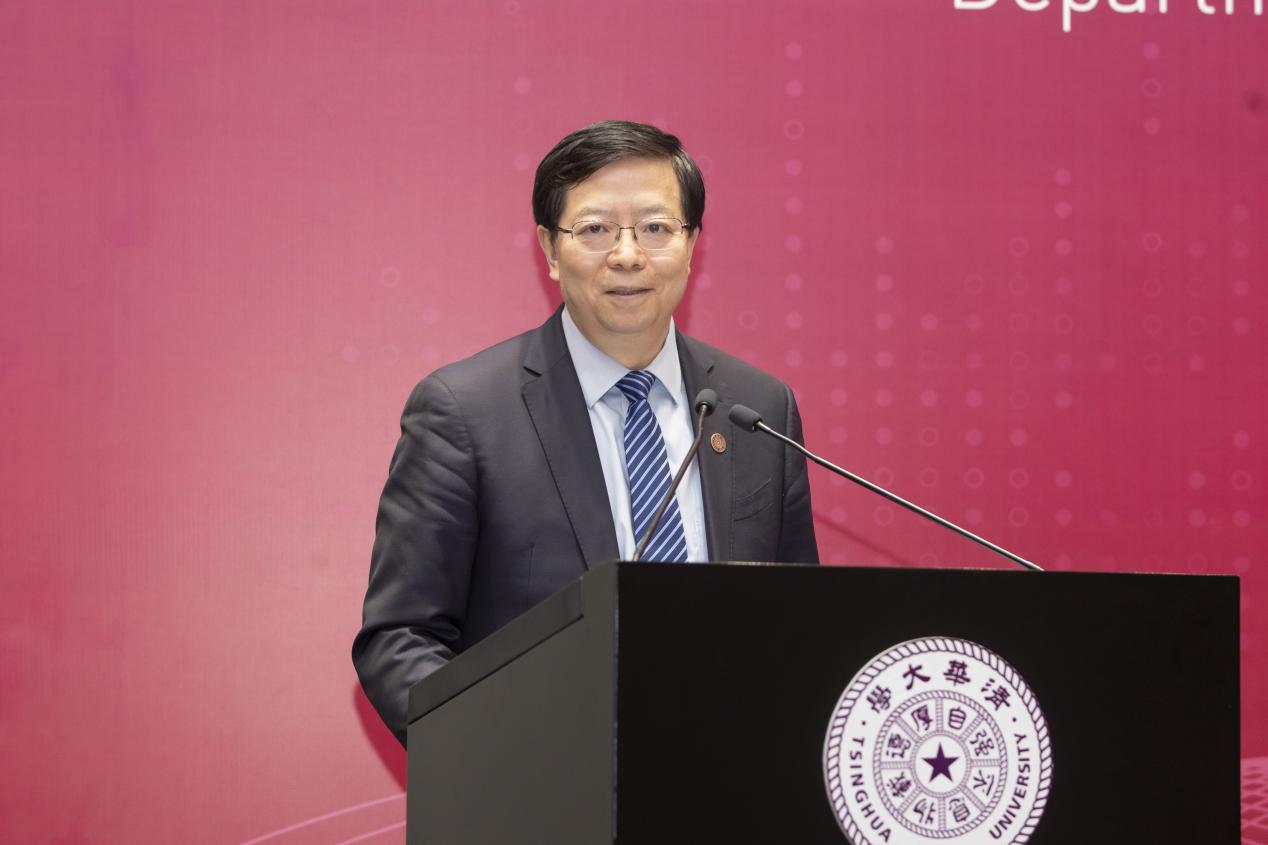
Yong Qiu delivered a speech
Yong Qiu stated that General Secretary Jinping Xi emphasized at the National Health and Wellness Conference the need to increase fundamental research on mental health issues and strengthen the training of mental health professionals. Tsinghua University's establishment of the Department of Psychological and Cognitive Sciences aims to promote interdisciplinary integration, strengthen fundamental research on the origin of consciousness and the essence of intelligence, construct and improve the theoretical system of mental health, actively serve the construction of Healthy China, and strive to promote the development of human mental health endeavors. The establishment of the Department of Psychological and Cognitive Sciences once again demonstrates the courage and responsibility of Tsinghua people in proactively serving major national strategic needs.
The mind perceives and embodies things, virtue and kindness benefit the world; reason leads to knowledge, and self-improvement creates the future. Yong Qiu emphasized that this is an endeavor that enters the human soul and also an endeavor that moves toward the future. In such an endeavor, universities cannot be absent, and Tsinghua cannot be absent. We must always take the world as our responsibility and always maintain an attitude of unity and progress, contributing wisdom and strength to creating a more beautiful future for humanity. Standing at a new starting point, I hope the Department of Psychological and Cognitive Sciences will persist in and strengthen the Party’s comprehensive leadership, focus on cultivating virtue and nurturing people, lead high-quality development through strong Party building, and forge new achievements for Tsinghua’s psychology discipline as the nation advances toward building a strong education system, a strong technological nation, a strong talent base, and a healthy China, while contributing to the university’s goal of steadily advancing toward the forefront of world-class institutions.
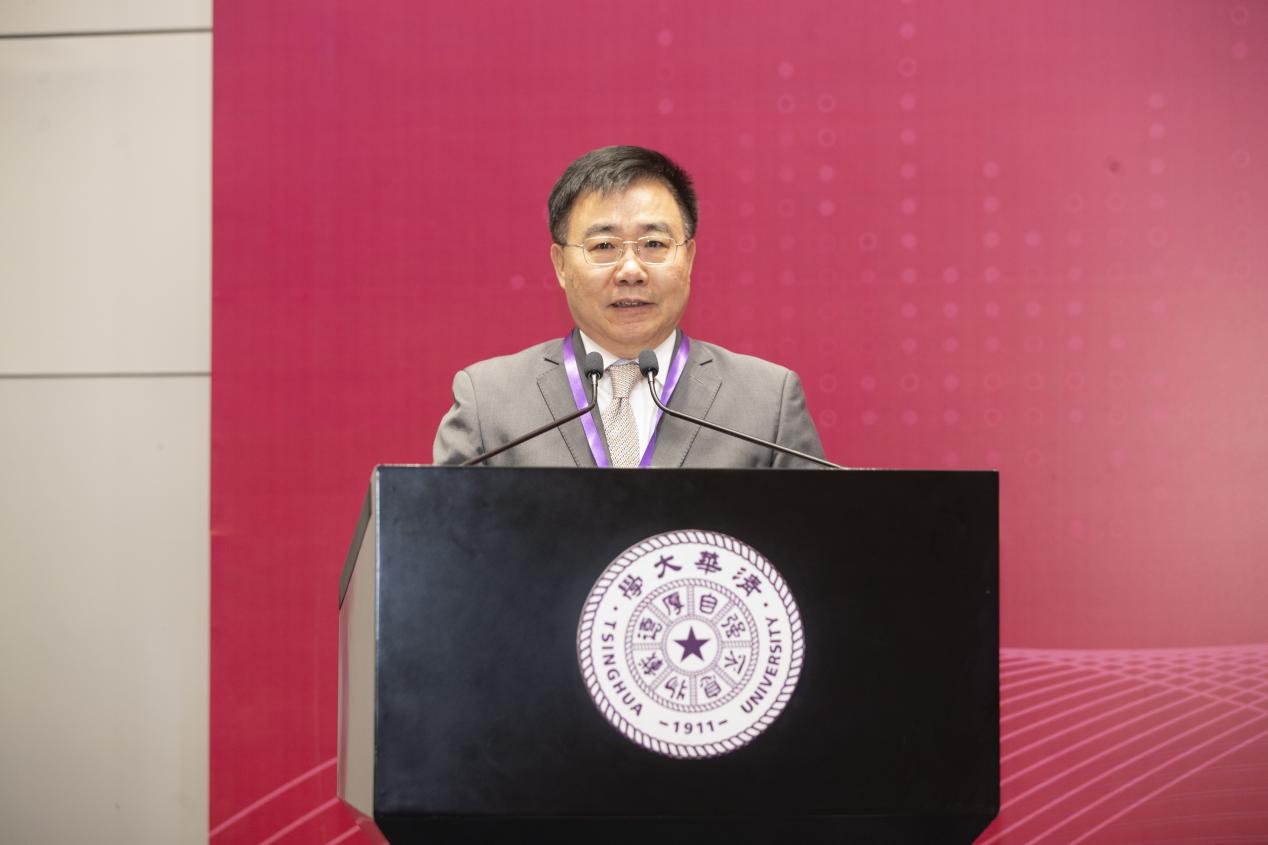
Zhimin He delivered a speech
Zhimin He stated that since the 18th National Congress of the Communist Party of China, the Party Central Committee with Comrade Jinping Xi at its core has attached great importance to mental health issues and repeatedly emphasized "integrating health into all policies." The Central Committee of China Association for Promoting Democracy highly focuses on issues such as adolescent mental health, basic education reform and development, and integrated development of education, technology, and talent, with fruitful results in policy recommendations. Currently, the development of artificial intelligence places greater demands on research into human cognition. Tsinghua University's establishment of the Department of Psychological and Cognitive Sciences, leveraging its advantages of concentrated innovation resources, profound fundamental research, and broad interdisciplinary platforms, and guided by national needs, has significant meaning. I hope the Department of Psychological and Cognitive Sciences will inherit and carry forward Tsinghua's fine traditions, actively lead academic frontiers, and make greater contributions to protecting public mental health and psychiatric wellness, serving national and social needs, promoting social stability and harmonious interpersonal relationships, enhancing public happiness, and comprehensively and effectively advancing the implementation of the Healthy China strategy.
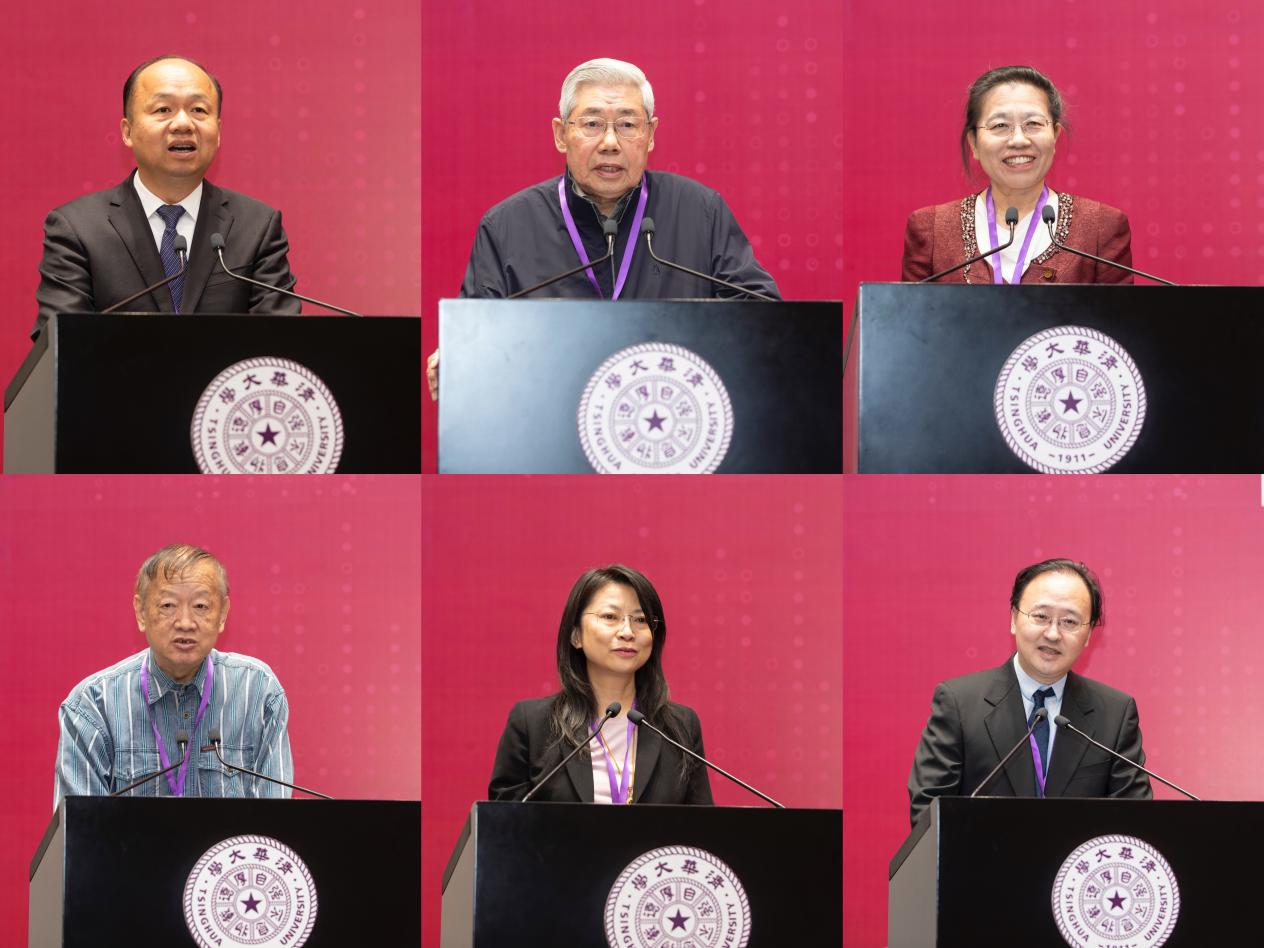
Hongwen Yao, Chongde Lin, Yanjie Su, Wenye Zhou, and Wangjia Yan delivered speeches in succession, and Jia Liu gave an introduction (pictured from left to right, top to bottom)
Hongwen Yao, Chongde Lin, Yanjie Su, Wenye Zhou, and Wangjia Yan delivered speeches successively, warmly congratulating the establishment of Tsinghua University's Department of Psychological and Cognitive Sciences, and expressing that Tsinghua University's establishment of the Department of Psychological and Cognitive Sciences is an important measure that conforms to the development of the times and actively responds to national strategic needs. They hope the Department of Psychological and Cognitive Sciences will strive to undertake the social responsibility of serving major national needs and continuously achieve new accomplishments in disciplinary construction, talent cultivation, and academic research, contributing strength to leading the development of China's psychology discipline. Jia Liu introduced the disciplinary development plan and future goals.
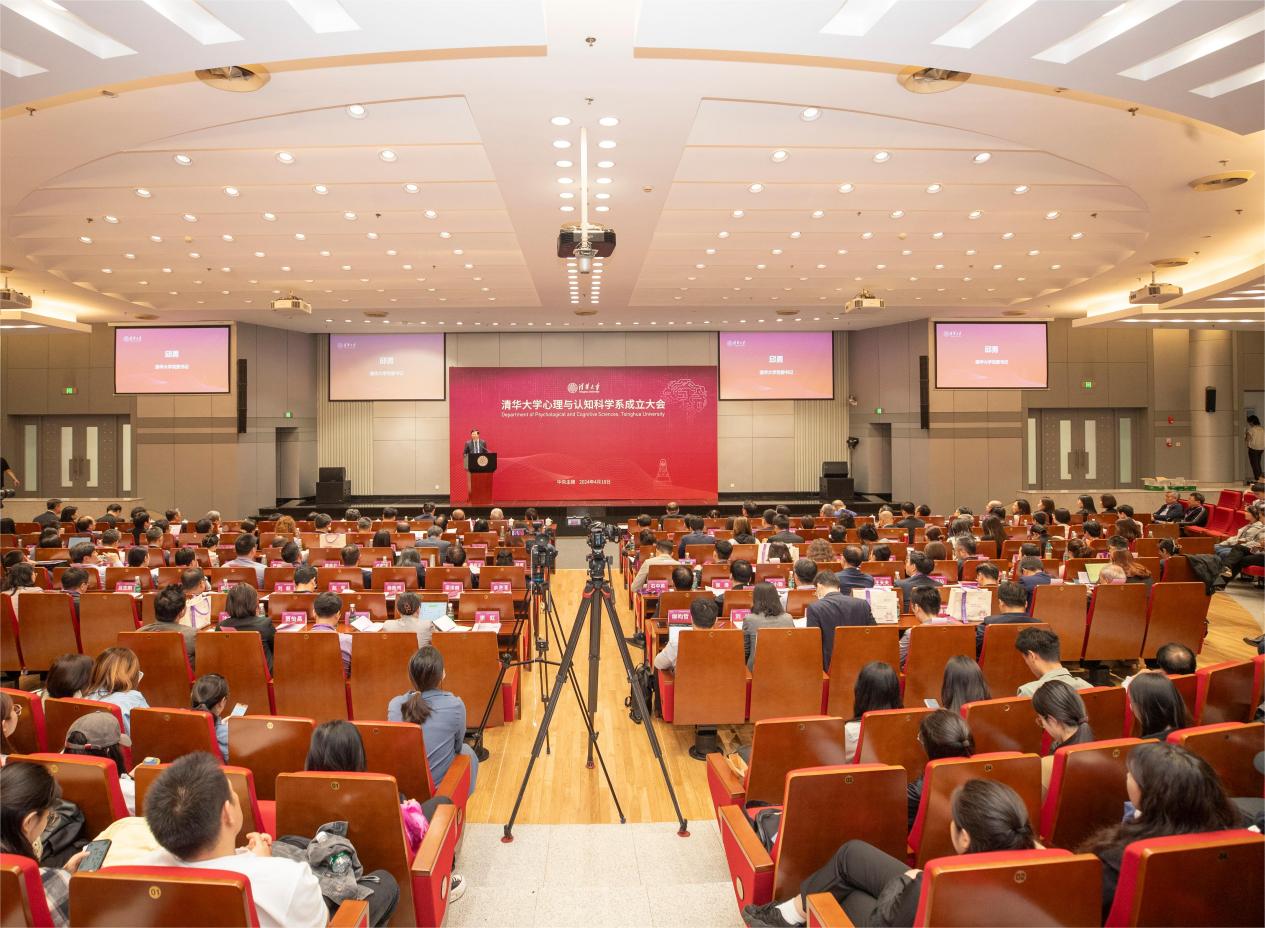
Establishment ceremony scene
The Tsinghua University Psychology Discipline Development Symposium was held concurrently, where attending expert scholars conducted in-depth exchanges focusing on topics such as psychology discipline talent cultivation, theoretical innovation, frontier research, and applications.
Tsinghua University's Department of Psychology was originally established in 1926 and was one of the earliest schools in China to establish a psychology major. Yue Tang, one of the founders of modern psychology in China, Li Chen, one of the founders of industrial psychology, and Xiangeng Zhou, a famous modern experimental psychologist, among other renowned scholars, once taught at Tsinghua. During the national university department adjustment in 1952, Tsinghua's Department of Psychology was merged into other schools along with the College of Science. After the reform and opening up, Tsinghua gradually began to restore psychology research and teaching, and in 2008 the university established the Department of Psychology within the School of Social Sciences. Over the past decade, the Department of Psychology has steadily improved its disciplinary development and social service capacity, trained a cohort of high-level psychology professionals, produced significant research achievements in areas such as the essential characteristics of human and machine intelligence and the development of psychological measurement methods based on brain-computer interface technology, and actively contributed to psychological crisis interventions during multiple major public emergencies.
To promote the development of psychology and cognitive disciplines and better serve the construction of Healthy China, the newly established Department of Psychological and Cognitive Sciences at Tsinghua University will be guided by the disciplinary positioning of “psychology as the foundation, promoting the integration of liberal arts and sciences; cognition as the characteristic, strengthening the combination of science and engineering”, and will develop the psychology discipline along two major research directions: cognition and intelligence, and society and health. Through the combination of psychology with cognitive science, brain science, artificial intelligence and other disciplines, it will mainly construct secondary disciplines such as general psychology and cognitive psychology, pioneer new frontiers in cognitive science research aimed at understanding the essence of intelligence, provide new research paradigms and experimental technologies for research on the cognitive neural mechanisms of psychology, and use "new technologies" to answer fundamental questions in psychology such as the origin of consciousness and the essence of intelligence. Through the integration of psychology with traditional Chinese culture, it will mainly construct secondary disciplines such as social psychology and clinical and counseling psychology, establish a theoretical system of mental health that incorporates Chinese cultural and intellectual contributions, develop diagnostic and intervention programs for psychological disorders based on intelligence and brain-cognitive technologies, enhance national mental health, foster positive and progressive social attitudes, and fulfil the social responsibility of serving major national needs.
Editor: Tian Qu, Ziyue Xu, Shou Qiu
Reviewer: Weiru Liu, Ling Guo

